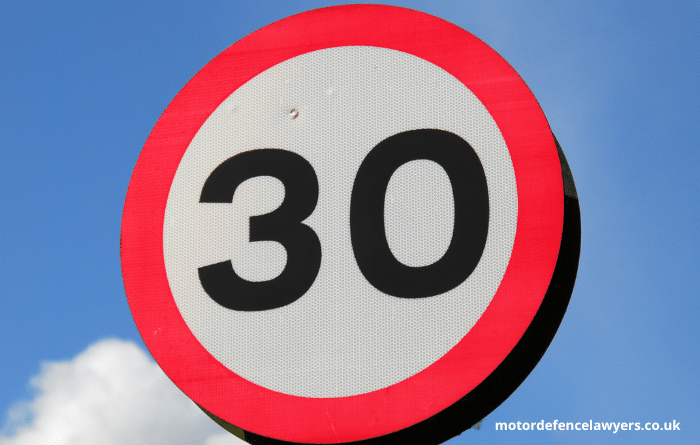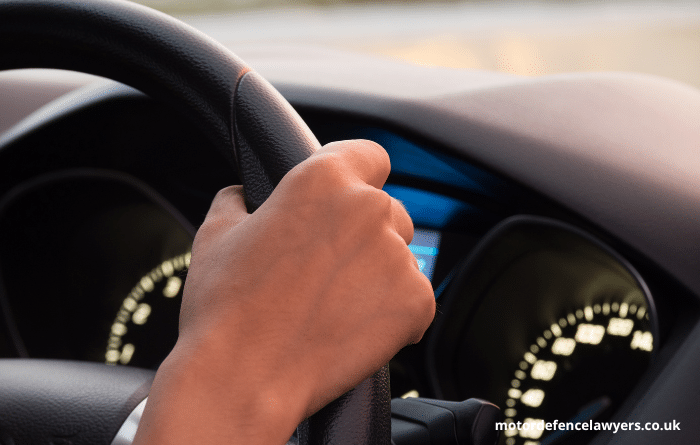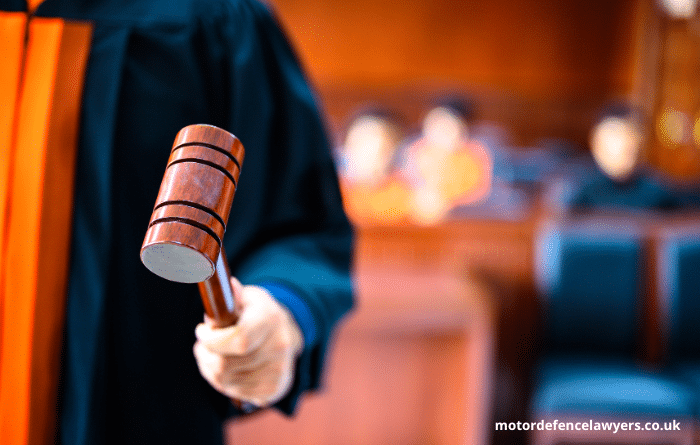Why Choose Us
- Ranked in the top 20 law firms by Trustpilot
- Nationwide Legal Coverage
- Free Consultation
- Fixed Fee Terms
- Competitive Rates
- Flexible Payment Plans
- Trusted Legal Care
- UK’s Leading Motoring Solicitors
4.8 out of 5
Our customers rate us
“EXCELLENT”
AS SEEN ON

02.10.2023
50 in a 30 – What To Do If You Are Caught Speeding
If you are caught driving at ’50 in a 30′ mph zone, it will be classed as a serious speeding offence and you should seek expert legal advice from firms like Caddick Davies. They can help you to prepare a strong case, whether you intend to contest or plead guilty, and can work to minimise the penalties against you and achieve a favourable outcome in court.
Speeding is one of the most common offences committed by motorists and makes up the majority of charges brought by the police against drivers on UK roads. The penalties for speeding can range from penalty points and fines to driving disqualification. The sentence imposed will be dependent upon the severity of the offence, your driving history (also known as ‘driving record’) and any mitigating or aggravating factors.
If you are facing a charge of speeding it’s important to seek expert legal advice. At Caddick Davies, we are experts when it comes to defending motoring offences, with decades of experience dealing with a diverse range of cases.
Whether you’re hoping to have the conviction overturned or planning to go to court and plead guilty to the offence, we can prepare a strong case that gives you the best chance of minimising the penalties faced and getting a successful outcome in court.
Contact our team for a free consultation at 0151 944 4967.
Read on for the charging procedure, options available to you and potential penalties that could be imposed if you find yourself charged with the offence of speeding.
Yes, driving at 50mph in a 30mph zone is an offence under Section 89 of the Road Traffic Regulation Act 1984. If you drive on a road or public place at any speed above the specified limit you are committing an offence and could be liable to prosecution.
The prosecution is required to prove 4 things in order for you to be guilty of speeding:
It is a common misconception that an offence has not been committed if you are driving within a specified tolerance of the limit. A regularly quoted tolerance is the 10% plus 2 rule in which it is often thought that you will not be guilty of speeding, such as doing 35mph in a 30mph zone.
The 10% plus 2 rule is misleading in that motorists commit a speeding offence as soon as they drive above the limit imposed on the road. This misrepresentation of the law has developed as a result of certain speed cameras not capturing drivers within this tolerance. It is important to point out that not all cameras work within this tolerance and the only safe speed to travel at is one within the legal speed limit as of the road.
There are two main ways that you can be caught speeding:
Most speeding offences will be caught by a static camera (usually mounted at the side of the road and bright yellow). However, an increasing number of offences are being caught by average speed cameras usually located on motorways or A-Roads.
If you have not been caught by a static camera, then you will have been caught by a police officer. Police officers can operate hand-held or mobile devices and will often be placed on bridges, after blind bends or on the central island of a road. You may also be caught by a police officer who has conducted a follow check on your vehicle. This requires the officer to have followed your vehicle at a fixed distance and recorded your speed by using their own calibrated speedometer.

If your vehicle has been caught by a speed camera the same police force will use your number plate to send a notice of intended prosecution and request driver details to the vehicle’s registered keeper. According to Section 1(1)(c) of the Road Traffic Offenders Act 1988, this notice must be received within 14 days of the alleged offence.
The registered keeper is obligated to provide the driver driving licence’s details and has 28 days to respond. Failing to do so can result in consequences.
For more details, refer to the Notice of Intended Prosecution Article.
If you are caught by an officer using a hand-held device or conducting a follow check, and that officer stops you, they will identify the driver and give a verbal notice of intended prosecution. In this case the police are not required to send a mailed notice of intended prosecution.
Speeding offences are the most common offence for which motorists receive conditional offers or the offer of a course (‘speed awareness course’).
After providing confirmation of driver details, you may be provided with a conditional offer of a fixed penalty—typically 3 penalty points and a £100 fine. Should the speeding offence be of a minor nature you may be offered a speed awareness course, which if accepted and completed within the specified time, will result in the conclusion of the speeding matter.
For more serious speeding offences, such as doing 50 in a 30, you are likely to receive a single justice procedure notice. The police have 6 months to issue proceedings, and you have 21 days to respond. Your options are:
Court attendance is mandatory in cases where:
Attendance may also be beneficial for disputing charges or presenting mitigating circumstances to minimise the points on your licence or avoid a ban.
For more, refer to: Tips to Avoid a Driving Ban.
The penalties for speeding will usually be dependent upon the speed at which you were travelling. The following guidance is provided for use in court:
| Speed Limit (MPH) | Recorded Speed (MPH) | ||
| 20 | 41 and above | 31 – 40 | 21 – 30 |
| 30 | 51 and above | 41 – 50 | 31 – 40 |
| 40 | 66 and above | 56 – 65 | 41 – 55 |
| 50 | 76 and above | 66 – 75 | 51 – 65 |
| 60 | 91 and above | 81 – 90 | 61 – 80 |
| 70 | 101 and above | 91 – 100 | 71 – 90 |
| Sentencing Range | Band C Fine | Band B Fine | Band A Fine |
| Points/Disqualification | Disqualify 7 – 56 days
Or 6 Points |
Disqualify 7 – 28 days
Or 4 – 6 Points |
3 Points |
As is shown by the guidance, doing 50 in a 30 would put you at risk of a short-term ban between 7 – 28 days or the imposition of penalty points ranging from 4 – 6 and a Band B fine.

Speeding offences are some of the hardest charges to challenge as they are almost always based upon evidence provided by a machine (the ‘camera’). The prosecution is required to prove 4 elements, as above, and if doubt can be cast on these you may be found not guilty of the offence. Some common examples of defences are:
In order to support your defence you may require:
If you admit that you committed a speeding offence, but do not believe you were travelling as fast as alleged by the police, it may be possible to advance a basis of plea. An example would be if the police allege you were travelling at 50 in a 30 but you recall travelling at a speed of no more than 45.
A basis of plea stating you travelled at 45 in a 30 can be presented to the prosecution at court and they can use their discretion to agree with proceeding on this lower speed. The benefit of this approach is that it can often lead to a reduction in the penalty points or disqualification imposed by the court.
It is important to note that this argument is more favourable in cases where a follow check has been conducted or a hand-held device used. This is because these methods have a greater level of uncertainty.
A plea in mitigation can be a useful approach if the evidence does not fall in your favour or you admit that you committed the offence. Providing strong mitigation to the court can be a useful way to keep any points or disqualifications imposed to a minimum.

Speeding offences are strict liability offences which means the court is only concerned with whether you committed the offence and not any intention or reason for doing so. However, in cases where there is a ‘special reason’ that the offence was committed, this can be presented to the court.
In cases where ‘special reasons’ are found the court has the power to not impose any minimum penalty amount at all.
‘Special reasons’ can be useful in cases where an offence has technically been committed but the circumstances in which it occurred are such that it would not be fair, just or proportionate to impose a sentence.
A special reason must be:
An example of a special reason for a speeding offence is driving in an emergency. This may be because you are trying to get to a hospital or aid someone who has injuries requiring urgent medical attention. Importantly, the court will always consider other options that were available in these cases in order to ensure that there was no other choice.
There is no hard and fast rule as to what constitutes a special reason, and it would therefore be best to contact a specialist motor defence lawyer for advice on this issue.
You should now have an understanding of the procedure taken when someone is caught speeding at 50 in a 30. To recap, a speeding offence is committed once you travel at any speed over the limit provided for that road.
Penalties include a fine and points or disqualification. At lower speeds you are likely to be offered a speed awareness course or alternatively a conditional offer of 3 points and a fine. If you are caught at higher speeds such as 50 in a 30 you are likely to be given a single justice procedure notice and may be required to attend court.
Dependent on whether you wish to enter a guilty plea or a not guilty plea there are defences available and opportunities to mitigate any sentence imposed.
At Caddick Davies Solicitors, we have a team of specialist motor defence lawyers who specialise in representing motorists at risk of disqualification or penalty points. From the simplest to the most complex of cases, we are here to help. We start every enquiry with an informal discussion to get a clear understanding of your circumstances and are here to answer any questions that you may have in confidence.
We will talk you through the offence you have been charged with and we will advise on your prospects of success at court.
You can contact our office for a free consultation on 0151 944 4967.
Why Choose Us
We have been successfully representing clients in motoring courts nationwide
Contact us for a free consultation, our expert solicitors will be able to discuss your case and advise on legal options.
Birmingham
Bradford
Bristol
Carlisle
Cardiff
Chelmsford
Huddersfield
Hull
Manchester
Liverpool
Leeds
London
Newcastle
Norwich
Nottingham
Sheffield